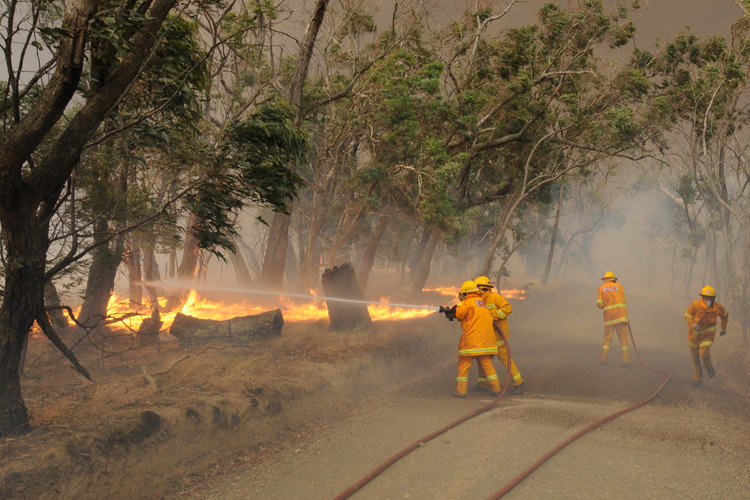Victorian Bushfire: Smoke Chokes Melbourne as Fires Rage Across Victoria
Melbourne is shrouded in a thick haze as bushfires rage across regional Victoria, putting homes and lives at risk. The city’s air quality has plummeted to hazardous levels, prompting health warnings and disrupting daily life due to Victorian Bushfire. Residents have been urged to stay indoors, limit outdoor activities, and use air purifiers if possible.
The Scale of the Crisis
Fires in regional areas, including the Gippsland region and parts of the Grampians, have burned thousands of hectares, driven by hot, dry winds and soaring temperatures. Authorities have issued emergency warnings for several communities, with evacuation orders in place for high-risk zones. Firefighters are working tirelessly to contain the blazes, but challenging conditions make their efforts difficult.
Victoria’s Emergency Management Commissioner, Jane Wilson, described the situation as “unprecedented,” emphasizing the speed and intensity of the fires. “We are seeing fire behavior that is both erratic and dangerous. Our priority is to ensure the safety of all Victorians,” she said.
Health Impacts
The smoke enveloping Melbourne poses a significant health risk, especially for vulnerable groups such as the elderly, young children, and those with pre-existing respiratory conditions. Hospitals have reported an increase in patients presenting with asthma, shortness of breath, and other smoke-related issues.
Dr. Emily Carter, a respiratory specialist at Melbourne General Hospital, advised residents to remain vigilant. “Exposure to fine particulate matter in the smoke can have both immediate and long-term health consequences. People should stay indoors, close windows, and use air conditioning on recirculate if available,” she said.
Public health authorities have also distributed face masks and issued guidelines on their proper use to reduce exposure. However, they cautioned that not all masks provide adequate protection against fine particles.
Transport and Infrastructure Disruptions
The smoke has significantly disrupted transport and infrastructure in Melbourne and surrounding areas. Flights at Melbourne Airport faced delays and cancellations due to poor visibility, while major highways leading to affected regions were closed to ensure safety.
Public transport services, including trains and trams, are also experiencing delays as operators prioritize passenger safety. Commuters have been advised to plan ahead and allow extra travel time.
Community Response and Support
Despite the grim circumstances, the Victorian community has rallied together to support those affected. Relief centers have been set up across the state, providing shelter, food, and medical assistance to evacuees. Local charities and volunteer organizations are working tirelessly to deliver supplies and offer emotional support to displaced families.
The state government has announced an emergency relief fund to assist affected residents and support recovery efforts. Premier Daniel Andrews emphasized the importance of community resilience during this crisis. “Victorians are strong, and we will get through this together. Our thoughts are with everyone impacted, and we will provide every resource necessary to support recovery,” he said.
Calls for Climate Action
The intensity and frequency of bushfires have reignited calls for stronger climate action. Environmental groups and scientists point to climate change as a major factor exacerbating fire conditions, citing rising temperatures, prolonged droughts, and reduced rainfall as contributing factors.
Professor Rachel Morgan, a climate scientist at the University of Melbourne, highlighted the urgent need for proactive measures. “This is a stark reminder of the impacts of climate change. Reducing emissions and investing in sustainable practices are critical to mitigating future risks,” she said.
What You Can Do
Residents are encouraged to stay informed through reliable sources such as the VicEmergency app and local news outlets. Those in fire-prone areas should have an evacuation plan and prepare an emergency kit with essentials like water, food, medications, and important documents.
For those in Melbourne, reducing outdoor activities and using air purifiers can help mitigate health risks. Checking on neighbors, particularly the elderly or those living alone, is also a valuable way to support the community.
Looking Ahead
As the crisis unfolds, the focus remains on containing the fires, protecting lives, and providing aid to those in need. The resilience of the Victorian community, combined with the tireless efforts of emergency services, offers hope amid the devastation.
The bushfire crisis serves as a sobering reminder of the need for preparedness and collective action in the face of natural disasters. By working together and addressing underlying challenges like climate change, Victoria can build a safer, more resilient future.

